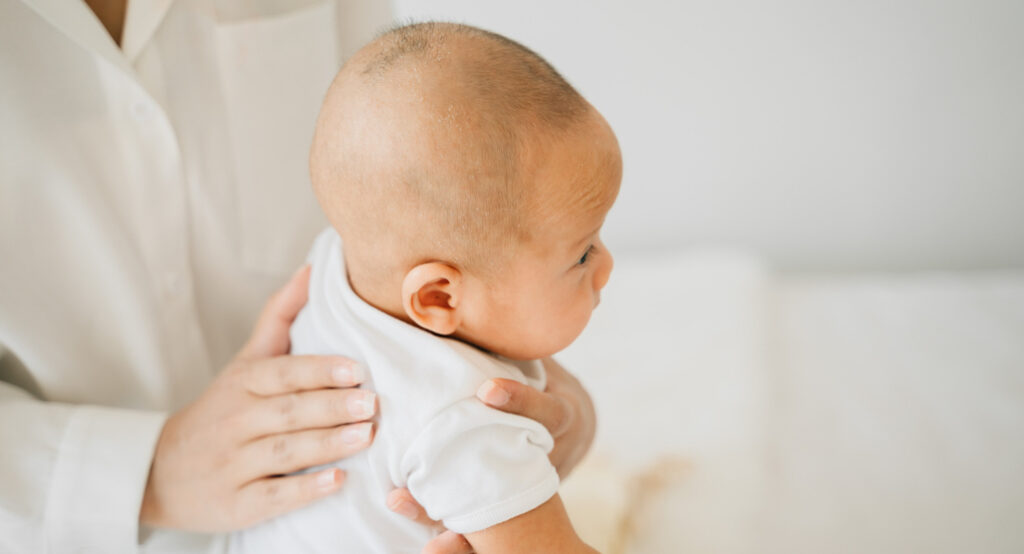
newborn hiccups after feed /newborn hiccups after eating
Why does your baby keep hiccuping? I heard that babies are more prone to hiccups than adults. What can I do to relieve my baby’s hiccups? Conversely, what should I do if my baby doesn’t burp when I drink milk and burp? How long must burping last? Does breastfeeding mean you don’t need to burp? Let’s hear what the doctor has to say.
Hiccups are involuntary jerks that occur when the diaphragm is stimulated, and they are sometimes audible as the muscles of the diaphragm contract quickly and air passes quickly through the tracheal stenosis. Also, sometimes when the baby feels cold, the diaphragm may contract and hiccups may occur. Or, when a diaper is wet, a few babies may hiccup. If you observe that your baby is more likely to hiccup when his diaper is wet, you can change his diaper more often. After changing his diaper, you can wrap him in a towel to prevent his diaphragm from rising due to the cold and compression.
How old will my baby be when he or she starts to burp?
Burping starts when your baby is still in your mother’s womb. Around 5 months of pregnancy, your baby may already have hiccups. Newborns can also hiccup after they are born.
Your baby’s diaphragm is not fully mature and will hiccup easily at the slightest irritation. In addition, babies’ swallowing function is not yet mature, and they may not be able to drink well enough to swallow more air, making them more prone to hiccups. When does your baby stop hiccuping all the time? The answer varies from person to person. At about 5 or 6 months of age, the diaphragm may be more mature, the baby’s milk-drinking skills may be getting better, and the baby may swallow less air during the milk-drinking process, so he or she may burp less often.
Is it normal for babies to burp a lot?
Generally speaking, most hiccups are normal, even if they occur many times. Normal hiccups are not particularly uncomfortable and do not affect mental energy. However, if a few babies have trouble sleeping, eating, or being mentally active because of hiccups, or if they even have an impact on their growth and development, this may be a warning sign of an abnormality and should be checked by a doctor. Abnormalities may include pneumonia, for example. Although fever is the main symptom of pneumonia, some babies with pneumonia may have frequent or persistent hiccups due to inflammation that irritates the diaphragm. Other possible pathologic causes include a very small number of people who have hiccups more often because of a tumor pressing on the diaphragm.
Another more common cause of hiccups is allergy. Sometimes a baby’s protein allergy may be expressed as hiccups, for example, if a breastfed baby is allergic to the protein in the milk she drinks or to the seafood she eats. But if this is the reason for the hiccups, and if the hiccups do not affect sleep or mental energy, you can observe them first and not worry too much. You can also observe if this has an effect on your baby’s hiccups.
How can I relieve my baby’s hiccups?
1.If your baby keeps hiccuping, it is recommended to feed him/her some milk (either breast milk or formula, about 20-30 C.C., or just after eating) to help relieve the irritation and tightness of the diaphragm. If you have already started drinking water, you can also give a small sip of warm water to relieve hiccups, but you should not drink too much water at once as it may cause a burden on the kidneys.
2.Hold the baby upright and pat the hiccups, it is easier to get the air out and it is less likely that the hiccups will be continuous.
3.Keep your baby warm, but don’t wear too many clothes. If the diaper gets wet, change to a new clean diaper, which may sometimes help relieve the hiccups.
4.Although sleeping on your stomach may help relieve hiccups, sleeping on your stomach is not recommended as it may increase the chance of sudden death.
5.If your baby keeps hiccuping, but is eating well, sleeping well, and has good energy, you don’t necessarily need to relieve the hiccups. However, if your baby has hiccups for more than 48 hours in a row, you should seek medical attention for possible inflammation or tumors.
What can I do if my baby doesn’t burp?
If your baby doesn’t burp, sit on your lap, support your baby’s chin or head and neck, and gently circle around or change positions to sometimes burp and expel air. However, it is important to note that at least until 4 months of age, the baby’s head and neck must be supported when changing positions; after 4 months of age, about 90% of babies have a harder, more stable neck.
Also, if your baby does not burp after drinking for about 10 minutes, you can hold your baby upright or lay him on his side to avoid choking on the spilled milk while he sleeps.
Do I still need to burp when breastfeeding?
When breastfeeding, although air is less likely to enter your baby’s stomach, it does not mean that no air enters at all, so burping is recommended until your baby is about 5 or 6 months old. It is recommended that you burp your baby until he/she is about 5 or 6 months old. In addition, if he/she is eating side dishes, burping is not necessary.
